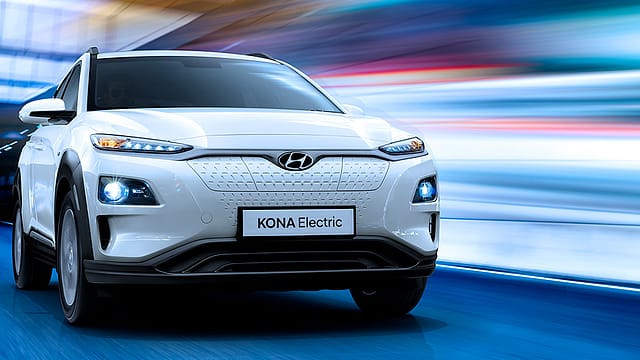Hyundai’s Kona Electric launched in India
ADVERTISEMENT

South Korean carmaker Hyundai launched its first fully electric SUV, the Kona Electric, in India on Tuesday. The company says “India’s first electric SUV” can go 452 km on a single charge and the running cost is 80% lower than that of a petrol car.
It has been named after the Kona district in Hawaii’s Big Island—the largest island that make the U.S. state—where the Ironman World Championship Triathlon happens every October. Its motor develops 40.27 kgm of torque which is distributed to the front wheels and can accelerate from 0 to 100 kmph in just 9.7 seconds. India’s second-largest carmaker has also factored in concerns for pedestrian safety while designing the SUV: the Kona comes with a virtual engine sound. Electric vehicles are relatively quieter than their fossil-fuel powered counterparts.
“The Kona Electric is the “the new normal”. The Kona Electric has received worldwide recognition and will be the most conducive e-vehicle for the Indian market. The electric SUV showcases strengths of its SUV model combined with the advanced innovative technology of an electric powertrain,” S.S. Kim, managing director and CEO, Hyundai Motors India Ltd, told reporters.
The compact SUV comes with two chargers—a portable charger that can be plugged into any regular 15 amp socket and a 7.2 kW AC wall-box charger. The wall-box charger can top-up charge the vehicle in one hour for running 50 km; the portable charger does this under three hours.
Hyundai has collaborated with Indian Oil Corporation to set up DC chargers at fuelling stations in select cities such as Delhi, Mumbai, Bengaluru and Chennai. Hyundai will invest in the equipment and installation of these fast chargers (CCS Type-single port). These chargers can charge the battery to 80% capacity in less than an hour. The electric charging port is seamlessly integrated with this grille area for convenient, head-in parking at charging stations.
Hyundai, which plans to launch 23 new electrical vehicles in the country by 2025, says the government’s efforts to promote electric vehicles sales are commendable. In her maiden Budget on July 5, finance minister Nirmala Sitaraman announced an income tax deduction of ₹1.5 lakh on loans for electric vehicles to incentivise their purchase. In addition to this, the government proposes to lower the GST rate on electric vehicles from 12% to 5%, which the industry had been seeking for some time now. “This amounts to a benefit of around ₹2.5 lakh over the loan period to the taxpayers who take loans to purchase electric vehicle,” Sitharaman had said in her Budget speech.
“India is ushering into a new era with Clean and Connected Mobility. We are committed to the government’s vision of ‘Shared’, ‘Connected’ and ‘Clean’ Mobility. Hyundai is leading the future mobility solutions globally and will bring in the most relevant technology in the clean mobility space in the Indian market,” Kim said.
The Kona comes in five colours—phantom black, polar white, marina blue, typhoon silver and polar white, and offers driving modes such as Eco+, Eco, Comfort and Sport.
The premium SUV is priced at ₹25,30,000 (ex-showroom). The company says that this price is keeping the 12% GST slab in mind.